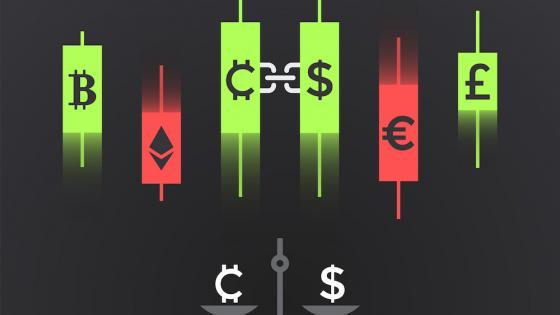The cryptocurrency landscape has expanded significantly since Bitcoin's inception in 2009. While Bitcoin remains the most well-known and widely adopted cryptocurrency, the market has evolved to include a vast array of crypto assets, each with unique features and use cases. This article delves into the diverse world of crypto assets, exploring the many options available beyond Bitcoin.
1. Ethereum: The Pioneer of Smart Contracts
Ethereum stands out as the second-largest cryptocurrency by market capitalization and is renowned for introducing smart contracts. These self-executing contracts with the terms of the agreement directly written into code have revolutionized how transactions and agreements are executed on the blockchain.
Ethereum's Ecosystem and Decentralized Applications (DApps)
Ethereum's blockchain supports a vast ecosystem of decentralized applications (DApps). These applications run on the Ethereum network, offering services ranging from decentralized finance (DeFi) platforms to non-fungible token (NFT) marketplaces. The flexibility and robustness of Ethereum's platform have made it the foundation for countless innovations in the crypto space.
2. Ripple (XRP): Revolutionizing Cross-Border Payments
Ripple and its native cryptocurrency, XRP, aim to transform the cross-border payment industry. RippleNet, the network powered by XRP, enables faster, more efficient international transactions, bypassing the traditional banking system's slow and costly processes.
Ripple's Strategic Partnerships
Ripple has established strategic partnerships with numerous financial institutions worldwide, enhancing its credibility and adoption. These partnerships facilitate the seamless transfer of value across borders, showcasing Ripple's potential to revolutionize global finance.
3. Litecoin: The Silver to Bitcoin's Gold
Often referred to as the silver to Bitcoin's gold, Litecoin was created by Charlie Lee to offer faster transaction times and a different hashing algorithm. Litecoin's network processes transactions more quickly than Bitcoin, making it a preferred choice for smaller, everyday transactions.
Litecoin's Robust Network
Litecoin boasts a robust and secure network, benefiting from its close technical similarity to Bitcoin. This similarity allows for easy integration and adoption, making Litecoin a staple in the cryptocurrency market.
4. Cardano: A Research-Driven Approach to Blockchain
Cardano differentiates itself through a research-driven approach to blockchain development. Founded by Charles Hoskinson, one of Ethereum's co-founders, Cardano emphasizes security, scalability, and sustainability.
The Cardano Ecosystem and ADA Token
Cardano's native cryptocurrency, ADA, fuels its network. The Cardano ecosystem supports a variety of projects and initiatives, ranging from DeFi applications to identity management systems. Its commitment to academic rigor and peer-reviewed research sets Cardano apart from many other crypto projects.
5. Polkadot: Enabling Blockchain Interoperability
Polkadot, developed by the Web3 Foundation, aims to create a scalable, interoperable blockchain network. Its unique design allows multiple blockchains, known as parachains, to interoperate within the Polkadot ecosystem.
DOT Token and Governance
Polkadot's native token, DOT, plays a crucial role in network governance and operations. Token holders can participate in decision-making processes, ensuring that the network evolves in a decentralized and community-driven manner.
6. Binance Coin (BNB): More Than Just an Exchange Token
Binance Coin (BNB) was initially created as a utility token for the Binance cryptocurrency exchange. However, its use cases have expanded significantly, encompassing transaction fee discounts, participation in token sales, and more.
BNB's Expanding Ecosystem
BNB is integral to the Binance Smart Chain (BSC), a blockchain platform enabling the creation of smart contracts and DApps. BSC's growing popularity has further cemented BNB's position as a versatile and valuable crypto asset.
7. Solana: High-Performance Blockchain for DApps and DeFi
Solana has garnered attention for its high-performance blockchain, capable of processing thousands of transactions per second. This scalability makes Solana an attractive platform for decentralized applications and decentralized finance projects.
SOL Token and Ecosystem Growth
The SOL token powers the Solana network, facilitating transactions and securing the network through staking. Solana's ecosystem continues to expand, attracting developers and projects seeking a fast and efficient blockchain platform.
8. Chainlink: Bridging the Gap Between Blockchain and Real-World Data
Chainlink provides a decentralized oracle network that enables smart contracts to securely interact with real-world data. This capability is crucial for a wide range of applications, from DeFi to supply chain management.
LINK Token and Network Security
Chainlink's native token, LINK, incentivizes data providers to supply accurate and reliable information. The decentralized nature of Chainlink's network ensures that no single point of failure can compromise the data integrity.
9. Stellar: Facilitating Low-Cost International Transfers
Stellar aims to simplify and reduce the cost of international money transfers. Its native cryptocurrency, Lumens (XLM), facilitates cross-border transactions, making it easier and more affordable to send money globally.
Stellar's Focus on Financial Inclusion
Stellar focuses on financial inclusion, working to provide access to financial services for underserved populations. Its partnerships with various financial institutions and organizations further its mission to make financial transactions more accessible and affordable.
Conclusion:
The cryptocurrency market is no longer dominated solely by Bitcoin. A diverse array of crypto assets offers unique features, use cases, and innovations. From Ethereum's smart contracts to Ripple's cross-border payment solutions, each crypto asset contributes to the evolving landscape of digital finance. As the market continues to grow, these crypto assets will play a crucial role in shaping the future of blockchain technology and decentralized finance.


